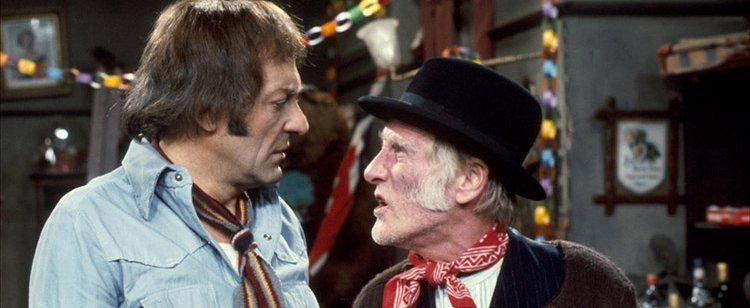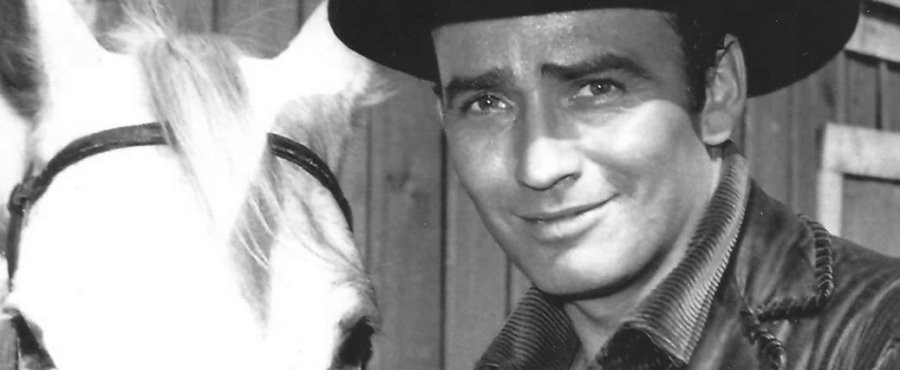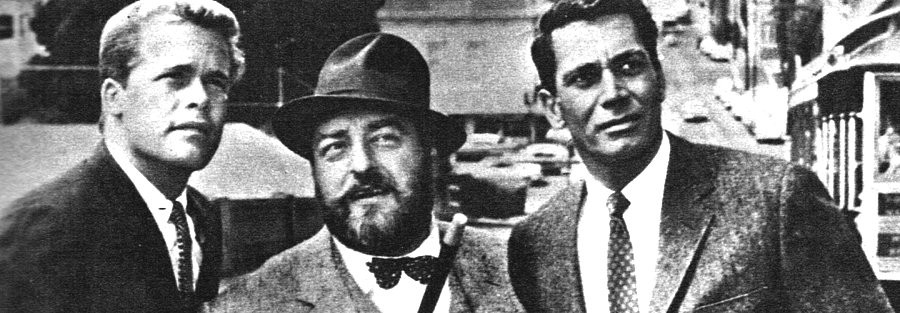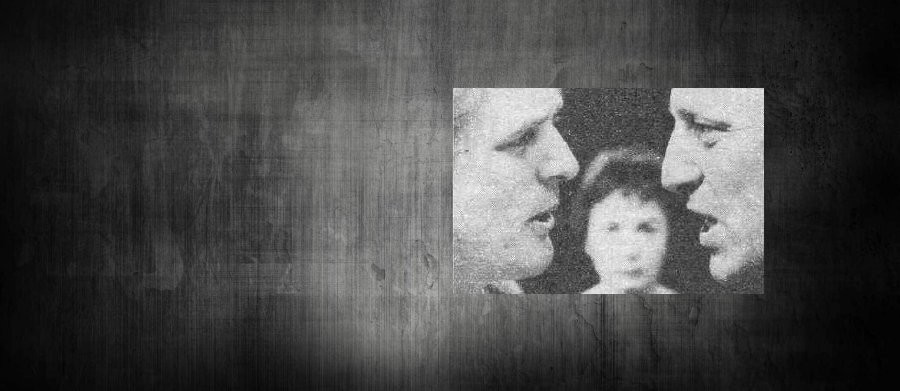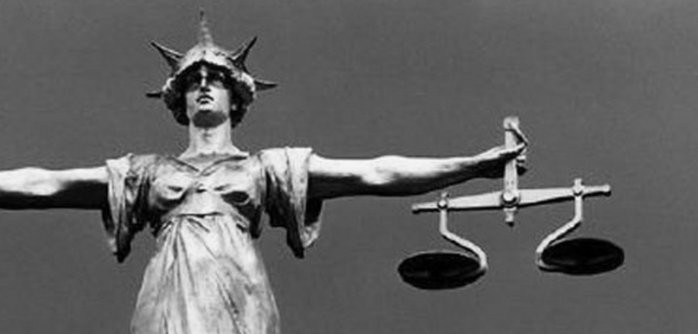
The Scales of Justice
1962 - United KingdomJust outside law courts in Middlesbrough, not far from the Bottle of Notes, there's a statue of a youngish woman holding up a squabbling boy and girl, one in each hand. The statue is called The Scales of Justice. I don't know what the woman is weighing up as she clutches the quarrelsome pair but, if she is anything like my mam, she's probably trying to decide which one to hit with the other.
I mention this to add a little local colour to what would otherwise be a tediously monochrome introduction to this piece about an old television programme called The Scales of Justice. Consisting of thirteen episodes, the final four in gorgeous, dreamy Eastmancolor, it was made between 1962 and 1967 and was originally intended as a second feature at the pictures. Since the early 1970s it has shown up sporadically in TV land, though I'm not sure if it ever made it as far as Tyne Tees, and can currently be seen on the Talking Pictures channel.
The series has a catchy instrumental theme by The Tornados, protégés of maverick music producer Joe Meek, and its title is taken from the statue of the Justice that looms over the Old Bailey in London, 'in her right hand the sword of power and retribution, in her left the scales of justice'. In the early episodes, these words are spoken by Michael Hordern but I am unable to recognise the voice-over artiste for the later ones. Inspector Google is silent on the matter so if anyone has any ideas I would be glad to hear them.
Each episode is introduced by Edgar Lustgarten. He is a dapper and erudite gentleman who is also, according to the solemn voiceover, a 'famous criminologist and authority on the legal system'. His job in this is to introduce the viewer to the details of a case played out in the law courts before handing over to a dramatization of events that led to the court case. He appears again at the end, much like the shop keeper in Mr Benn, to deliver the moral of the tale.
The moral of Edgar Lustgarten's tale is how short-lived and fickle fame can be. Lustgarten died in 1978 so he's probably past caring but, although a well-known TV face of the 1950s and 1960s, he is sadly forgotten today. I have always had square eyes but I was unaware of him until the Bravo channel started showing old episodes of Scotland Yard in the early 1990s.
He is an eloquent and hospitable host who comes across as quite likeable. In the admittedly arbitrary marking system that I use to judge my fellow men and women, you gain a few extra points if you're dead. That's why Edgar Lustgarten currently enjoys an approval rating in the high sixties while other TV personalities, who through no fault of their own are still in the pink at the time of writing, languish in the low to mid-fifties.
We judge each other every day and we don't have to don a fancy wig and gown to do so. It's a good bet that neither Joe Meek nor The Tornados would have rated highly in Edgar's estimation but the world's a big enough place for everyone, isn't it?
A man with such an earnest and learned manner is, of course, ripe for parody. Robbie Coltrane, as Edgar Dustcarten, produced a skit in the mid-1980s. It was a parody that was well past its sell-by date and would have been lost on me and, I suspect, lots of other younger viewers. A few years before this, the great Stanley Baxter, in the guise of Edgar Lastgasper, performed a merciless and very funny pastiche of Edgar in his Scotland Yard days. If Mr Coltrane had been paying attention he would have seen that Stanley Baxter nailed it and rendered any other send-up null and void. A young telly watcher today would be hard pushed to recognise a talent such as Stanley Baxter, never mind poor old Edgar, for all the fame that he had in his lifetime.
Regular viewers of the Carry Ons will have no difficulty recognising the producers of the Scales of Justice. The giveaway is the naked man, kneeling under the weight of some sort of spherical structure that he's carrying Atlas-like on his shoulders. The names of Nat Cohen and Stuart Levy emblazoned immodestly across the centre of it, and the portentous fanfare, show that both men are as proud as punch to be responsible for another Anglo-Amalgamated Production.
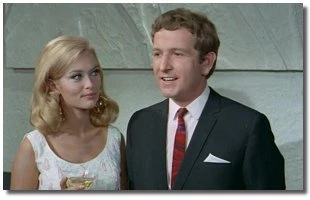
The Scales of Justice kept good, reliable TV actors in work. The Haunted Man, an episode in glorious Eastmancolor from 1966, has Keith Barron as a property developer who may, or may not, be responsible for the armed robbery that left an actor, played by James Ellis, with memory loss. Ellis is best known as Bert Lynch from Z Cars. My parents wouldn't let me watch Z Cars but I remember catching the odd episode when they weren't looking. This would be in the mid-1970s and, by then, Bert had made it all the way to the lofty heights of Inspector. He puts in a good performance here but, probably to disassociate himself from Bert Lynch, he neutralises his distinctive Northern Irish accent.
I never knew there were so many antipodean actors plying their trade in Britain in the 1960s.
Aussie actor Ray Barrett, fresh from doing his rounds in Emergency-Ward 10, turns up in Moment of Decision, a tense black and white episode from 1962. He plays a down on his luck salesman whose disturbed wife steals a stranger's baby on Wimbledon Common. She doesn't steal any old baby. The poor woman helps herself to the biggest, roundest baby ever filmed. Never mind Eastmancolor, this episode needs CinemaScope to ensure that the kid stays in the viewfinder.
Barrett's character is so desperate for money that, instead of handing the baby back, he tries to extort a ransom from the distraught but rich parents. Not a very nice man then, but when you're short of cash, and charged with a baby threatening to eat you out of house and home, as the phrase is, you find yourself doing things you don't expect. Luckily, the baby is found before he gets through the emergency stash of Woodbines that he keeps hidden in his nappy (relax, it's the 1960s, everybody smokes, although he's the first baby I've seen using a cigarette holder). Popster Mike Sarne makes good use of his flair for languages to take on the role of the errant nanny's German boyfriend. If he hadn't invited her to come outside (whatever that is in German), the baby would have been safe and all the ensuing unpleasantness could have been avoided. A fresh-faced Michael Aspel also pops up as a TV newsreader who informs the great British public of the kidnapped baby.

In The Material Witness from 1965, New Zealander Noel Travarthen puts in a mediocre turn as a young executive who shops his boss for drink-driving and takes over his job while he is in prison. The episode also features the estimable Reginald Marsh, as the drink-driving boss who, on his release from prison, finds himself unable to get another job and is forced to emigrate with his wife and daughter. At the end of the episode the Travarthen character finds himself hoist by his own petard. Reginald Marsh, first known to me as George and Mildred's brother-in-law, is an actor who can always be relied upon to give a good performance. He was never a big star but he was instantly recognisable and some of his class always rubbed off on anything he appeared in.
The late, great Aussie character actor, Kenneth J Warren, billed here as plain old Kenneth Warren, brings more than a touch of anxiety to The Invisible Asset from 1963. I am used to seeing him as a bald-headed character but he sports a relatively luxuriant head of hair in this episode. Mr Warren will be a familiar face to those of us who like watching vintage TV. He died in 1973, at the early age of 43, and this was a sad loss of a talented and memorable actor. He provides a nice, edgy turn here as the restaurant owner who bugs the table of a group of businessmen so that he can make a killing on the stock market. That's when blackmail rears its urbane head in the shape of Ronald Leigh-Hunt who, when he realises that blackmail is useless, pursues him all the way to the bankruptcy court. It's an entertaining episode with a sad and haunting ending. Who'd have thought bankruptcy could be so exciting?
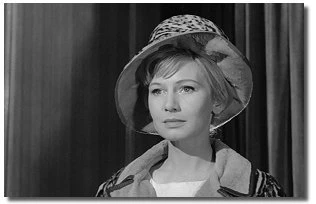
The Hidden Face from 1965 is the tale of Jane Penshurst, a crusading female journalist played by Christine Finn, who writes a book demolishing the reputations of various worthy members of society. One of them, a prominent MP, commits suicide after reading what she has to say about him. His son vows revenge and has his day in court. We all have our hidden faces that we don't want others to see even, it transpires, crusading journalists. Neither side wins but, thanks to a last-minute courtroom appearance from a certain Mrs Rose Jenkins, the viewer is left with a clearer picture of who Ms Penshurst is. Mrs Jenkins is played by Gretchen Franklin who is probably best known as Ethel from EastEnders. She doesn't look any different in this episode so I can only conclude from this that she has always looked old.
The episode has a lovely throw-away scene, set in a restaurant, in which Derek Nimmo and David Garth, as members of the legal profession, take time out from complaining about their steaks to discuss the merits of taking someone to court.

Another memorable episode is The Undesirable Neighbour from 1963, in which vengeful harpie Vanda Godsell decides that her attractive young neighbour, Anna (played by New Zealander Bridget Armstrong), is taking too much interest in the opposite sex and starts spreading malicious rumours about her. This is too much for Anna so she takes her to court for slander. The alert viewer will recognise a be-wigged Garfield Morgan as the barrister who attempts to drag the good name of the young neighbour through the mud. He turns up again, as a crooked businessman, in the full-colour episode The Company of Fools.
Anna and her malicious neighbour strut their stuff in down town Stevenage. If a soulless new town can have a soulmate Stevenage has found hers in Billingham, where I live. We have many things to be thankful to the 1960s for but drab, Poulsonesque architecture isn't one of them. If, like me, you find the greyness of the surroundings on display depressing, you can always distract yourself by grabbing a comb and some tissue paper and playing along with the jaunty number that accompanies most of the action. I'll join you on the spoons if you don't mind. The tissue paper makes my lips go all tickly. For those who like to keep count, Ms Armstrong also makes an appearance in the episode Infamous Conduct, another glorious full-colour episode from 1966.
I suspect I am letting all this legal drama go to my head but I think I would make a good high court judge. I would change my surname to Once so that I could be known as Justice Once. My catchphrase would be 'Justice once, I'm going to let you off but if you do it again you've had it'. Court rooms can be serious and intimidating places and, if I want to inject a bit of levity into the proceedings then, go on, let them hang me for it.
The authoritative figure of Edgar Lustgarten has the uncanny knack of forcing me to think about what I would do in morally tricky situations. What would I do if a stranger started slandering me? How would I react if someone questioned my taste in TV programmes? The answer, of course, depends on how thorough an examination my conscience can withstand at the time of asking.
If you're not a particularly contemplative person you can always view each episode as you would a moving picture postcard sent from an exotic, far-away England of bus conductors, Ford Zephyrs and the Epilogue.
You could also do as I did and try and work out where you have seen that actor playing the Official Receiver in The Invisible Asset. You know, he was in The Cedar Tree and that Dracula film in which he plays the Count's creepy man servant. I guarantee that, in each episode, there will be at least one such face that you can't quite put a name to. It's at times like this that you realise that the end credits can sometimes be your best friend and they very cordially revealed that the face belonged to good old Philip Latham.
The informative end credits also reveal that the vibrant Tornados tune is available on Decca Records No: F11662 so, if you want to rush out and buy it, you should do so now while stocks last. The more cautious among us could, of course, listen to it one of those cosy record shop cubicles before deciding to part with their hard-earned six bob. I think it's well worth the money. In my own in camera session of Juke Box Jury I vote the tune a hit, a very palpable hit.
Seen this show? How do you rate it?
Seen this show? How do you rate it?
Published on January 27th, 2019. Written by Andrew Coby (November 2017) for Television Heaven.





